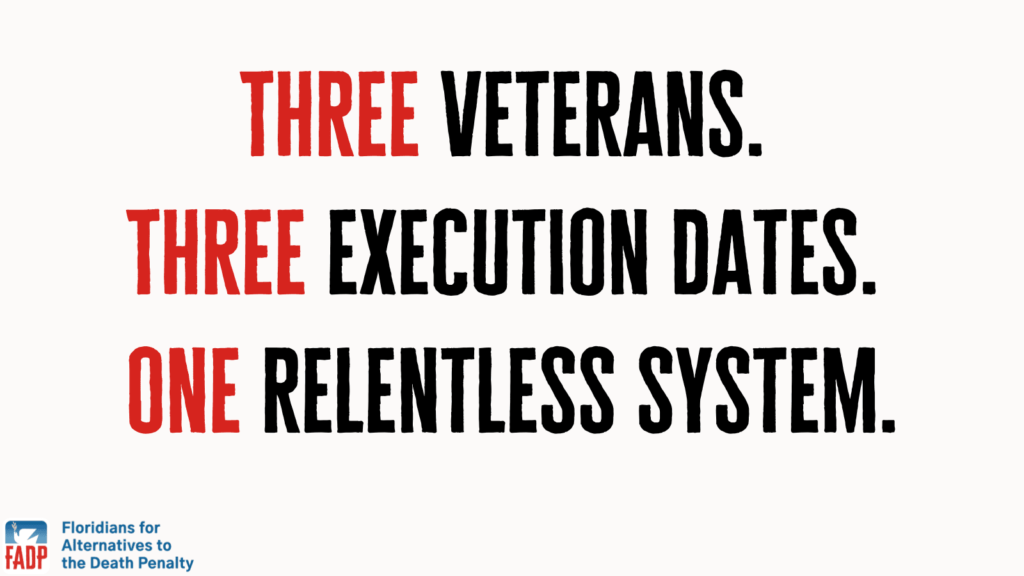At Sustainable Action Now, we spotlight critical social justice issues, including the ongoing debate over capital punishment. This week, Florida Governor Ron DeSantis signed a death warrant for U.S. Army veteran Richard Randolph (Malik Abdul-Sajjad), scheduling his execution for November 20 at 6 p.m. This latest move underscores a troubling trend: Florida now has three veterans on death watch, all scheduled for execution within a 23-day span—the fastest pace in modern state history.
🕒 Death Watch Schedule
Florida’s current execution schedule includes:
- Norman Mearle Grim — October 28
- Bryan Frederick Jennings — November 13
- Richard Randolph (Malik Abdul-Sajjad) — November 20
All three men served in the U.S. military, a detail that intensifies concerns about justice, trauma, and rehabilitation. Rather than creating safety, this accelerated schedule highlights systemic failures that deepen cycles of harm.
💔 Malik Abdul-Sajjad: A Veteran’s Life Under the Death Penalty
Malik’s story exemplifies many of the flaws inherent in Florida’s death penalty system. After graduating high school, he enlisted in the Army, serving honorably. Following his discharge, Malik struggled with addiction, which he used to self-medicate unaddressed childhood trauma. His addiction escalated over time, culminating in the circumstances that led to his death sentence.
The jury that recommended Malik’s execution did so by a narrow 8-4 vote, a practice the U.S. Supreme Court ruled unconstitutional less than a decade ago. Florida, rather than adhering to that ruling, reinstated the practice—revealing systemic resistance to aligning state law with federal mandates.
🧬 New Evidence and a Life Reconsidered
Decades later, newly uncovered evidence has profoundly changed Malik’s narrative. He discovered that his birth mother, a 17-year-old at the time of his adoption, spent 50 years searching for him. For decades, Malik lived unaware that he was wanted and loved.
This revelation reshapes how any fair-minded juror would view his life story, trauma, and humanity, yet Florida’s death penalty system continues to move forward with execution. Malik’s case raises urgent ethical questions about sentencing individuals with complex histories, mental health struggles, and lifelong trauma.
⚠️ Systemic Critiques
Malik’s story is emblematic of broader concerns regarding capital punishment:
- Veterans and Trauma: Executing men who have served in the military fails to account for combat-related trauma and post-service mental health challenges.
- Unconstitutional Practices: Narrow jury recommendations for execution contradict Supreme Court rulings, yet Florida has reinstated the practice.
- Fast-Tracked Executions: The unprecedented pace—three veterans within 23 days—raises concerns about due process and the ability to fully review mitigating circumstances.
As Floridians for Alternatives to the Death Penalty (FADP) emphasize, this approach does not increase public safety. Instead, it perpetuates cycles of suffering while ignoring the potential for rehabilitation and restorative justice.
🌱 A Call for Justice
Florida should halt all executions, especially in cases where defendants are veterans or individuals with lifelong trauma and mental health challenges. Sentencing schemes must align with constitutional mandates and respect both due process and human dignity.
This moment also underscores the broader need for reform: alternative sentencing, restorative justice programs, and mental health interventions must replace state-sanctioned killing as a solution to societal harm.
📢 Get Involved and Learn More
At Sustainable Action Now, we support informed advocacy, awareness, and action on issues surrounding the death penalty. To explore more, learn about alternatives, and engage with resources on this critical topic, visit our Death Penalty Category.
Malik Abdul-Sajjad’s story is not just about one individual; it is a reflection of systemic injustice, the consequences of trauma ignored, and the urgent need for a humane, just, and evidence-based approach to criminal justice in Florida and across the United States.


